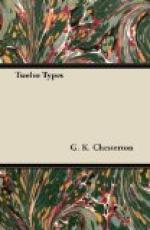POPE AND THE ART OF SATIRE
The general critical theory common in this and the last century is that it was very easy for the imitators of Pope to write English poetry. The classical couplet was a thing that anyone could do. So far as that goes, one may justifiably answer by asking any one to try. It may be easier really to have wit, than really, in the boldest and most enduring sense, to have imagination. But it is immeasurably easier to pretend to have imagination than to pretend to have wit. A man may indulge in a sham rhapsody, because it may be the triumph of a rhapsody to be unintelligible. But a man cannot indulge in a sham joke, because it is the ruin of a joke to be unintelligible. A man may pretend to be a poet: he can no more pretend to be a wit than he can pretend to bring rabbits out of a hat without having learnt to be a conjuror. Therefore, it may be submitted, there was a certain discipline in the old antithetical couplet of Pope and his followers. If it did not permit of the great liberty of wisdom used by the minority of great geniuses, neither did it permit of the great liberty of folly which is used by the majority of small writers. A prophet could not be a poet in those days, perhaps, but at least a fool could not be a poet. If we take, for the sake of example, such a line as Pope’s
‘Damn with faint praise, assent with civil leer,’
the test is comparatively simple. A great poet would not have written such a line, perhaps. But a minor poet could not.
Supposing that a lyric poet of the new school really had to deal with such an idea as that expressed in Pope’s line about Man:
‘A being darkly wise and rudely great.’
Is it really so certain that he would go deeper into the matter than that old antithetical jingle goes? I venture to doubt whether he would really be any wiser or weirder or more imaginative or more profound. The one thing that he would really be, would be longer. Instead of writing
‘A being darkly wise and rudely great,’
the contemporary poet, in his elaborately ornamented book of verses, would produce something like the following:—
’A creature
Of feature
More dark, more dark, more
dark than skies,
Yea, darkly wise, yea, darkly
wise:
Darkly wise as a formless
fate
And if he be great
If he be great, then rudely
great,
Rudely great as a plough that
plies,
And darkly wise, and darkly
wise.’
Have we really learnt to think more broadly? Or have we only learnt to spread our thoughts thinner? I have a dark suspicion that a modern poet might manufacture an admirable lyric out of almost every line of Pope.




